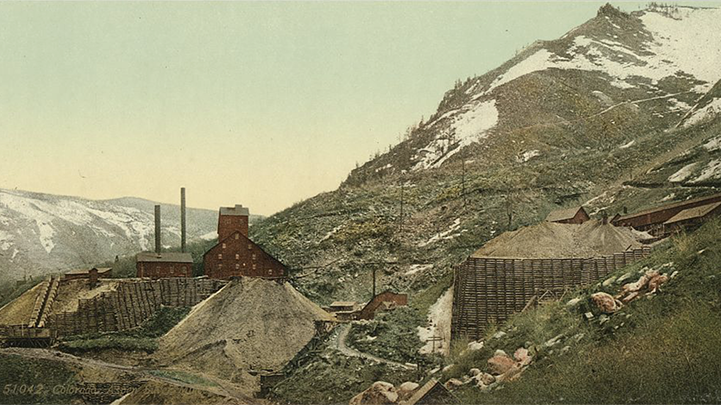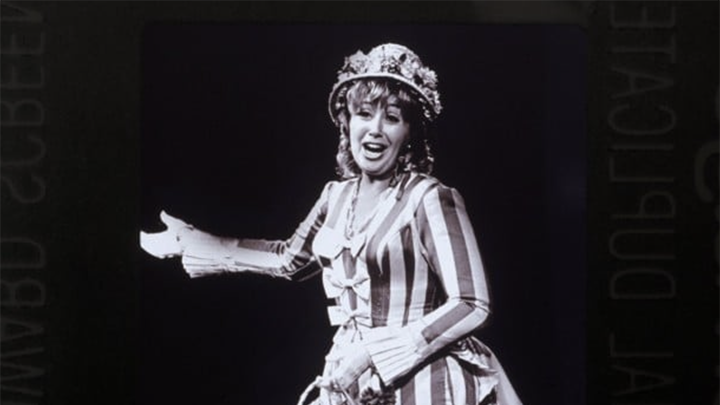The shade of Maria Callas falls long over many of the roles she sang, as does Joan Sutherland’s. Yet I can’t think of an opera so closely identified with any one singer as much as Beverly Sills is with Douglas Moore and John Latouche’s’s The Ballad of Baby Doe. Premiered in Central City, Colorado in 1956 and brought to the New York City Opera two years later, many assume that it was written for Sills because it exploited her gifts as a singing actress so perfectly. Although it’s been revived a handful of times over the years with such fine singers as Ruth Welting, Elizabeth Futral, and Ruth Ann Swenson, it’s particular brand of 1950’s Broadway/opera Americana hasn’t ever regained the standing it once enjoyed in the repertoire.
Yours truly has been clutching my studio recording probably since it was re-issued by Deutsche Grammophon 20 years ago. So, I was thrilled when I heard that The Opera Buffs were presenting a performance in concert at the Colburn School of Music Downtown in Zipper Hall.
The Opera Buffs have been supporting young singers in the Los Angeles area for over 40 years. That was back in the day when Los Angeles didn’t have an actual opera company and the only infrastructure consisted of college programs. They’ve provided financial assistance for the myriad things young singers require to over 700 performers to the tune of well over $1.1 million dollars since their inception. A small sample of the talent they’ve helped includes Angel Blue, Sondra Radvanovsky, Joshua Gerrero, Danielle De Neise, Rod Gilfrey, Michelle De Young, Angela Meade, and up-and-coming tenor Anthony Leon. Yours truly was even presented by them in a concert back in my UCLA days. The importance of their work and their generosity is integral to the musical life of Los Angeles.
Music Director and Conductor Brent McMunn made a short speech before the performance about how much the musicians involved enjoyed learning and performing Moore’s music in rehearsal. He presided over a 30-piece orchestra assembled for the afternoon that played deftly and more than did justice to the work’s wealth of melody, folk tunes, waltzes, and orchestral effects.
Because of my involvement with the Verdi Chorus, I was familiar with most of the leading singers involved, save one important exception. Baby Doe has a very large cast — five leading parts with over a dozen smaller named roles in the ensemble, including cameos by President Chester A. Arthur and William Jennings Bryan. The young cast was extraordinarily strong and able and although everyone performed on book, it seemed more out of reference than actual need.
The true story of Elizabeth “Baby” Doe and her devotion to silver-magnet Horace Tabor is a characteristically American tale filled with fortunes and reputations won and lost. Back when our country was still expanding and company-towns, like Tabor’s Leadville, flourished with powerful robber barons running them instead of local governments and divorce was looked at as a black stain on a person’s character. Tabor fell in love with Baby Doe, divorced his wife Augusta, and spent the rest of his life trying to reclaim his reputation as his fortunes dwindled due to gambling and speculation. Doe remained true to him and froze to death thirty years later, living in a shed near the Matchless Mine, the once greatest source of his wealth.
Erin Wood played Baby Doe’s plain-spoken Mother McCourt whose ignorance and lack of tact causes more than a few troubles during the course of the story. Ms. Wood brought a powerful soprano with just the right amount of naivete to a character that could easily become a villain in the wrong hands. She was especially moving in the Act II scene in which she visits Augusta after Horace’s luck has run out and begs her to help the couple.
Mezzo-soprano Audrey Babcock ate the role of Augusta Tabor with a spoon. She relished every glorious character moment this role had to offer her and keenly took thorough advantage of all of them. She never letting even the smallest gesture or inflection go for naught, to the point that even her entrances and exits became integral parts of her performance and relished by the audience. She tartly and potently peered over the top of her glasses at almost everyone at one point or another. Vocally, she was extremely strong, even in Moore’s most taxing writing of the role for the ‘Leadville Fricka.’ Plus, if she ever gets to sing Strauss’s Klytemnestra, she’s already got the perfect gown and I will insist she take it out of her closet for an encore.
Ben Lowe is one of those singers who just seems to pour forth with seemingly little effort but an abundance of heart. It’s a warm, rich baritone voice with reserves to spare and he brought an earnestness to Horace Tabor’s love for Baby Doe that easily filled the theater. He made much of his big final scena and was touching in his character’s final moments when he hallucinates the events surrounding his life and the opening of the Leadville Opera House.
Graycen Gardner is a name I was not familiar with, but I certainly hope to become so in the future. She has a truly beautiful instrument, evenly produced with a crystal clear bloom on the top. I’d call it a full lyric with excellent coloratura technique. The role is full of challenges above the staff and Ms. Gardner dispatched with all of them with apparent ease. She was spot on in the “Willow Song” right from the first and very moving in her confrontation with Augusta. I wanted maybe just a little more pathos and word-painting in ‘Always through the changing’ at the close, but this was a very assured performance for someone so young. She wore a modestly designed silver gown with a million sparkles that seemed a bit much at first glance, but as her performance progressed, it seemed only too appropriate.
Maestro McMunn kept his players on their toes, as did Moore’s very busy score. I was pleasantly surprised at how well they managed the seemingly constant changes of rhythm and style throughout the afternoon’s performance. He also gave fine direction and support to the singers performing the wealth of smaller roles (who also made up the chorus when needed). Two standouts were Manfred Anaya as Chester A. Arthur and Marc Callahan as WIlliam Jennings Bryan.
Supertitles were provided above the platform but frankly I don’t think they were needed as everyone’s diction was so sharp.
I can’t imagine I’ll ever have a better opportunity to enjoy this opera again and I certainly look forward to the Opera Buffs next presentation.
Photos: Beth Bergman




